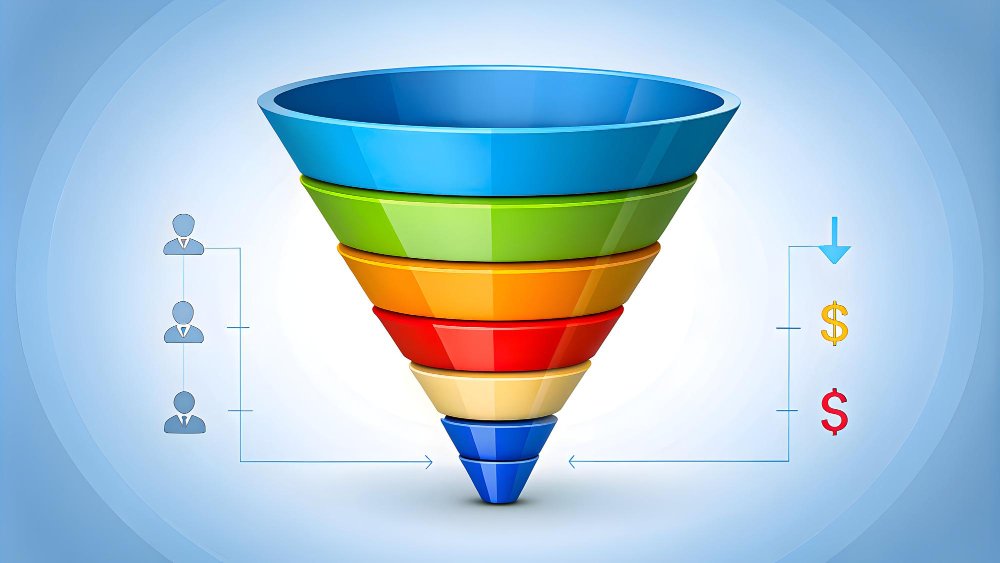In 2025, it’s not enough to run ads and hope for clicks. Without a well-structured sales funnel, even the best ad creative can underperform.
A sales funnel turns casual browsers into loyal buyers—systematically. Whether you’re using Google Ads, Facebook/Meta Ads, LinkedIn, or TikTok, this guide shows you how to build a high-converting sales funnel using paid advertising.
Why You Need a Funnel (Not Just Ads)
Most businesses waste ad budgets by sending traffic straight to a homepage or generic landing page. That’s like proposing marriage on a first date.
A sales funnel:
- Warms up cold leads
- Builds trust and authority
- Nurtures interest into intent
- Increases conversion rates
1. Understand the Customer Journey: TOFU, MOFU, BOFU
Before creating a funnel, you need to map the three key funnel stages:
- TOFU (Top of Funnel): Awareness
Goal: Attract attention from cold audiences
Tactic: Engaging ads with educational or entertaining content - MOFU (Middle of Funnel): Consideration
Goal: Build trust and educate potential customers
Tactic: Lead magnets, product demos, case studies - BOFU (Bottom of Funnel): Conversion
Goal: Drive action or sales
Tactic: Direct offers, testimonials, limited-time deals
2. Build the Funnel Step-by-Step
Let’s break down what each stage should include in your paid ads strategy.
TOFU – Capture Attention
- Ad Platforms: Facebook, Instagram, YouTube, TikTok
- Creative Ideas: Educational videos, industry tips, relatable reels
- Targeting: Broad or interest-based audiences
- Landing Page: Blog post, free guide, quiz, or video
- CTA: “Learn more,” “Download,” or “Take the quiz”
MOFU – Generate Leads
- Ad Platforms: Meta retargeting, LinkedIn, Google Display
- Creative Ideas: Ebooks, case studies, webinars, testimonials
- Targeting: Warm audiences (retargeted video viewers, site visitors)
- Landing Page: Lead magnet with opt-in form
- CTA: “Download now,” “Reserve your seat,” “Get the checklist”
BOFU – Drive Conversions
- Ad Platforms: Google Search, Meta Custom Audiences
- Creative Ideas: Product demos, free trials, limited-time offers
- Targeting: Hot leads (engaged users, abandoned carts, email list)
- Landing Page: Sales page or checkout
- CTA: “Start now,” “Book a call,” “Buy today”
3. Design Landing Pages That Convert
Your ads are only as good as your landing page. Each stage of your funnel needs a dedicated, focused page that aligns with user intent.
Best Practices:
- One CTA per page (no distractions)
- Mobile-first design
- Fast loading speed (<3s)
- Trust signals (testimonials, reviews, badges)
- Clear, benefit-driven copy
4. Use Retargeting to Re-Engage and Convert
Most people won’t convert on the first visit. Retargeting is how you follow up and bring them back.
Retargeting Ideas:
- Show testimonials or social proof to hesitant buyers
- Offer a discount code after an abandoned cart
- Run reminder ads for those who watched your webinar or video
Use Meta Pixel, Google Ads Remarketing Tag, or LinkedIn Insight Tag to build retargeting audiences.
5. Match Your Creative to Funnel Stage
Each funnel stage demands a different tone and style in your ad creative.
| Funnel Stage | Tone & Creative | Goal |
|---|---|---|
| TOFU | Educational, entertaining | Stop the scroll |
| MOFU | Value-focused, informative | Capture email / educate |
| BOFU | Urgent, clear, persuasive | Drive the sale |
Use carousel ads, video ads, testimonials, and live demos where appropriate.
6. Set Your Budget Intelligently
Start small, scale smart. Allocate your budget by funnel stage:
- TOFU: 40–50% of budget (low cost, broad reach)
- MOFU: 25–35% (warm audiences)
- BOFU: 20–30% (highest ROI, conversion focus)
Always monitor cost per lead (CPL), click-through rate (CTR), and return on ad spend (ROAS).
7. Track, Measure & Optimize
Without tracking, you’re flying blind. Set up proper analytics and attribution from Day 1.
What to track:
- CTR, CPC, CPM
- Lead form submissions
- Sales or conversions
- Landing page bounce rate
- Email opt-in rate
Use:
- Google Analytics 4 (GA4) for funnel tracking
- UTM parameters for campaign-level insights
- A/B testing to refine headlines, images, and CTAs
Conclusion: Paid Ads + Funnel = Profit
Running ads without a sales funnel is like pouring water into a bucket full of holes. By building a full-funnel strategy, you:
- Lower ad costs
- Increase conversions
- Scale faster with confidence
Whether you’re in eCommerce, SaaS, coaching, or B2B services, a high-converting funnel is your secret weapon.



